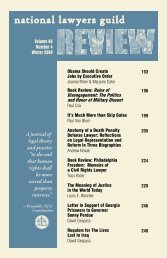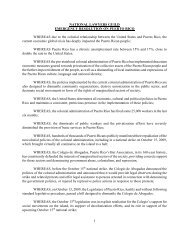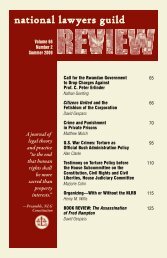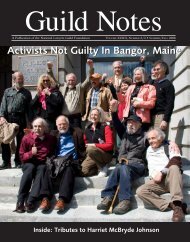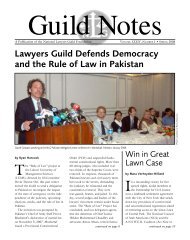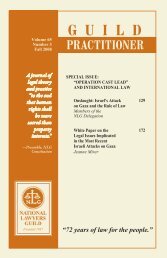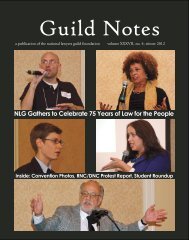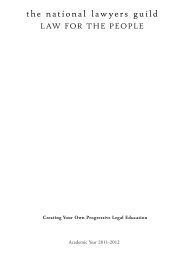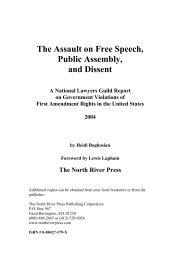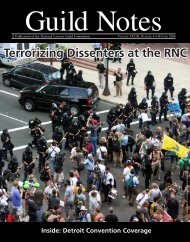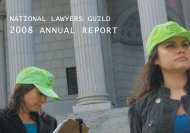NLGRev 68-2[1].indd - National Lawyers Guild
NLGRev 68-2[1].indd - National Lawyers Guild
NLGRev 68-2[1].indd - National Lawyers Guild
Create successful ePaper yourself
Turn your PDF publications into a flip-book with our unique Google optimized e-Paper software.
110 national lawyers guild review<br />
While the NLRB issues over 1,000 complaints per year, 5 few of which<br />
attract news coverage, this complaint set off a firestorm. The Republican<br />
establishment and the business lobby issued a barrage of press releases describing<br />
this action as “dangerous” and “chilling.” Utah Senator Orrin Hatch<br />
took to the floor of the Senate to issue a lengthy tirade expressing outrage<br />
that a government official would dare to question “how a private company<br />
is permitted to do business.” 6 Every single Republican member of the Senate<br />
Health Education Labor and Pensions committee signed a letter to the<br />
NLRB’s General Counsel, Lafe Solomon, questioning “the legal reasoning<br />
and motive behind the complaint.” The letter went on to express concern<br />
“about the chilling effect that your action may have on business decisions<br />
across the country.” 7<br />
Republican House members quickly introduced a bill, H.R. 2587, that<br />
would bar the Board from ever ordering any employer “to restore or reinstate<br />
any work, product, production line, or equipment, to rescind any relocation,<br />
transfer, subcontracting, outsourcing, or other change regarding the location,<br />
entity, or employer who shall be engaged in production or other business<br />
operations, or to require any employer to make an initial or additional investment<br />
at a particular plant, facility or location.” Every single Republican on<br />
the House Education and Workforce Committee voted in favor of the bill.<br />
In addition, the House Oversight and Government Reform Committee sent<br />
Solomon an unprecedented subpoena seeking all documents in the Board’s<br />
possession referring or relating to Boeing in order to get the “complete facts”<br />
about his office’s decision-making process. 8 In an equally unprecedented<br />
move, sixteen state attorneys general filed an amicus brief on Boeing’s behalf<br />
urging the administrative law judge to dismiss the complaint because the<br />
General Counsel’s theory “will harm the ability of every State … to attract<br />
businesses and promote job growth.” 9 Notably, the brief did not cite a single<br />
case or refer to any empirical data.<br />
There are undoubtedly many different reasons why this complaint—the<br />
first step in a multi-tiered administrative process 10 —has generated so much<br />
controversy. Surely one reason is that Boeing has an especially skilled public<br />
relations and lobbying apparatus at its disposal. But that is not the whole story.<br />
Another part of the answer is that the NLRA is generally so toothless that<br />
it is almost shocking for the NLRB to seek a remedy that actually has the<br />
potential to impose meaningful costs on an employer. 11 Bear in mind that in<br />
the typical case, even when an employer commits especially flagrant violations<br />
of the Act, for instance by threatening workers that they will be fired if<br />
they attempt to unionize or by spying on the workers’ off-site union meeting,<br />
the traditional remedy is simply a cease-and-desist order and a requirement


![NLGRev 68-2[1].indd - National Lawyers Guild](https://img.yumpu.com/30820772/48/500x640/nlgrev-68-21indd-national-lawyers-guild.jpg)
